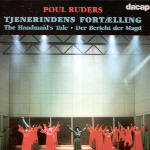For a modern opera to become an instant classic is nearly unheard of today, but with The Handmaid’s Tale, a powerful and gripping new work by Danish composer Poul Ruders, with an English libretto by Paul Bentley (a Danish language version was prepared for the world premiere in Denmark, from which this recording stems), we just might have one on our hands. Early acquaintance with this work reveals it to be the first great masterpiece of the 21st century, similar in impact to Alban Berg’s Wozzeck.
Based on the novel by Margaret Atwood, the opera vividly creates a nightmarish future in which the United States government has been replaced by a totalitarian fundamentalist Christian theocracy that has stripped women of all their rights, enslaving many of them as Handmaids, sexual surrogates who bear children for the infertile wives of the men in power. The work opens in the year 2195 at an historical symposium that is reviewing the videotaped diary of a Handmaid called Offred (the Handmaid “of Fred”). Her story launches the drama, as she recalls her free life in the Old Time, her arrest for adultery under the new government, the taking of her daughter by the state, and her life of oppression, degradation, and terror in the service of Serena, for whom she is to bear a child with the Commander. Offred’s forced love affair with the Commander, eventually discovered by Serena, and her real one with his man-servant, ends when she is taken away by the Eyes of God, the brutal Secret Police of the new order, who just might also be working for a shadowy resistance movement. (Offred’s final fate is left undisclosed at the opera’s conclusion.)
Ruders’ and Bentley’s scenario closely follows Atwood’s novel, though some scenes were rearranged to make the drama more effective on the stage. Judging by this stunning recording, they have succeeded enormously. The work is brilliantly cinematic, employing the use of flashbacks to simultaneously portray the past and present. One ingenious scene sets Offred in a duet with her past self (The Double), a beautifully written piece that stands as the lyrical highpoint of the opera. The music also sounds cinematic, in the best sense of being immediately impactful and descriptive; but Ruders’ work is far more cohesive than any film score. He employs a large orchestra with a full battery of percussion, augmented by synthesizer, creating some of the most chilling, unworldly sounds of futurist horror you’ve ever heard. The vocal lines are amazingly clear and accessible for a modern opera, and while no one would confuse them with bel canto, the solo writing has a cantabile quality that makes it far more singable than today’s norm. However frightening the situation the music falls directly and expressively on the ear.
The performers are simply stunning. Marianne Rorholm perfectly embodies the fear, despair, and defiance of the beleaguered Offred, and she ideally partners Hanne Fische as Offred’s “time before” self. As Aunt Lydia, the twisted “Mother Superior” of the Handmaids, Anne Margrethe Dahl pulls out all the stops in her hysterical, tyrannical ranting. The rest of the women in this heavily female cast give uniformly fine performances. Of the men, Aage Haugland excels as the tender but flawed commander, while Poul Elming brings warmth and life to the effete and useless Luke (Offred’s former husband). The Royal Danish Opera Chorus along with Michael Schonwandt and the Royal Danish Orchestra turn in a miraculously gripping performance of this brilliant, highly challenging score. Dacapo’s live recording easily captures the work’s huge dynamic range. The opera was a hit at its premiere, and two English language productions (in England and Minnesota) are in the works. But unless and until you can get to those cities to hear it live, this magnificent recording is the best way to experience Ruders’ spectacular achievement. Don’t miss it.
































